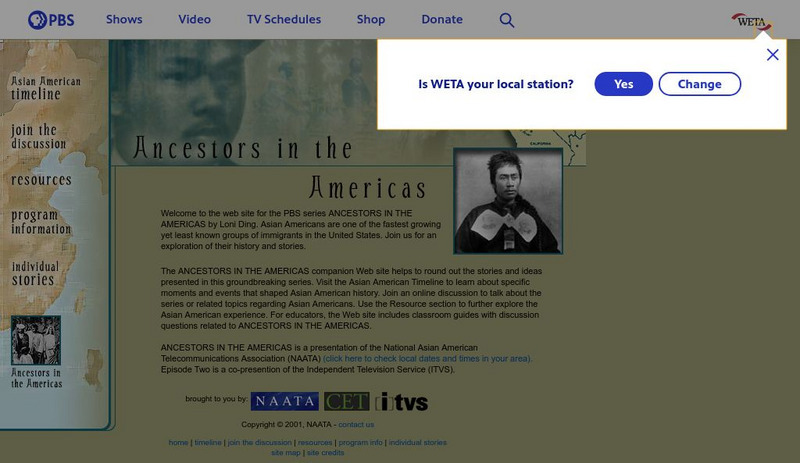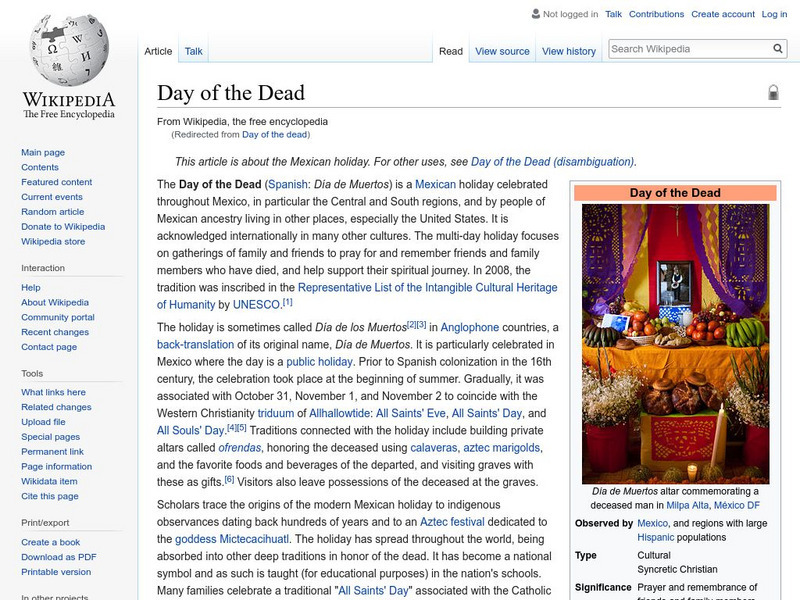Hi, what do you want to do?
Curated OER
Current Connections
Students recognize that history can be easily altered and changed, and consider ways to prevent deceptions about the Holocaust. They create class quilt that shows how to create harmony, understanding and tolerance of others.
Curated OER
Oral Genealogy
Young scholars research their family histories by conducing interviews with parents and grandparents. They put their histories into a chant or a chart/family tree and present it to their class.
Curated OER
Discovering My Family History
Students research their family trees. They research Internet sites, conduct interviews and, when possible, access primary sources to compile information about their family's history. Students present their findings in a family tree.
Curated OER
Chapter 10: Racial and Ethnic Relations
In this racial and ethnic relations in America worksheet, students answer 15 matching questions and respond to 7 short answer questions regarding various racial and ethnic groups terms and issues in U.S. society.
Curated OER
Treaties
Fifth graders investigate Canadian history by examining the alliances made in the past. In this Canadian treaties lesson, 5th graders identify the Native Americans of Canada, known as the First Nations people or Aboriginals. Students...
Curated OER
Meet a Creature From Ancient China
Students view an image of a Chinese chimera and complete a chart describing what they see and understand about the creature. They compare funerary customs today to those of ancient China. They compile a list of items that might be...
Curated OER
Biology Chapter 15 Word Search Puzzle
In this biology worksheet, middle schoolers look for the words that are related to the theme of the worksheet. They also work on the skills of spelling and word recognition.
Curated OER
What Is It?
Students view photographs of an area where artifacts where recently taken. Using the artifacts, they work together to try to determine the occupations, diet and other information about a specific group of people. They write an artifact...
Cold Spring Harbor Laboratory
Dna From the Beginning: Living Things Share Common Genes
This multimedia article includes animations, pictures, video, biographical information, and quiz questions that are accessed by clicking on buttons along the bottom of the page. Here you can see how common genes are evidence for common...
University of California
University of California Museum of Paleontology: Homologies
These pages are from the Understanding Evolution website for teachers. They focus on homologous structures that organisms with common ancestors share.
PBS
Pbs Learning Media: Riddle of the Bones
At the online companion Web site of "Evolution," the seven-episode series on PBS, piece together clues to how one of our early ancestors looked as you examine images from four significant fossil finds of Australopithecus afarensis.
Khan Academy
Khan Academy: Answers to Exploration Questions: What Is a Dinosaur?
Do you know what a dinosaur is? This site has answers to the exploration questions about dinosaurs and a common ancestors.
CommonLit
Common Lit: Book Pairings: "Holes" by Louis Sacher
Stanley Yelnats is sent to a juvenile correctional camp for boys where each day he is forced to dig holes into a dry lake bed. Selected (8) reading passages (grades 5-8) to pair with the novel "Holes" by Louis Sacher. [Free account...
PBS
Pbs Learning Media: Genetic Variation
This video segment from NOVA: "Cracking the Code of Life" explores the genetic similarities and differences among organisms.
PBS
Pbs: Ancestors in the Americas
Site examines the social, political, and economic issues that influenced the first Asian migration to the Americas in the eighteenth and nineteenth centuries. Includes guidelines for helping students distinguish truthful, historically...
Wikimedia
Wikipedia: Day of the Dead
This encyclopedia article from Wikipedia explores what Day of the Dead is and how it is commonly celebrated in Mexico and elsewhere.
Other
Bringing History Home: Immigration History
This 2nd grade unit invites children to learn their ancestors' native countries of origin. The take-home page for family ancestry offers several alternatives to citing a specific family immigration history. Studying immigration provides...
Other
Black Hills Institute of Geological Research, Inc.: Ammonoids
Ammonoids, more commonly referred to as Ammonites, are the extinct ancestors of today's octopus, squid and nautilus. This page provides excellent information about these creatures, as well as diagrams and pictures.
Countries and Their Cultures
Countries and Their Cultures: Mossi
The Mossi are the most prominent ethnic group in the modern nation of Burkina Faso (formerly Upper Volta). They are also well known in the anthropological literature as a society with an especially high rate of labor migration to...
Curated OER
Wikipedia: National Historic Landmarks in South Dakota: Bloom Site
This fortified archaeological site preserves the remains of about 25 rectangular houses dating to c.1000 CE. The site also once contained several burial mounds, which were later destroyed by cultivation. Site was perhaps occupied by...
Curated OER
Unesco: Argentina: Cueva De Las Manos, Rio Pinturas
The Cueva de las Manos, Rio Pinturas, contains an exceptional assemblage of cave art, executed between 13,000 and 9,500 years ago. It takes its name (Cave of the Hands) from the stencilled outlines of human hands in the cave, but there...
Curated OER
Black Hills Institute of Geological Research, Inc.: Ammonoids
Ammonoids, more commonly referred to as Ammonites, are the extinct ancestors of today's octopus, squid and nautilus. This page shows several types.


















